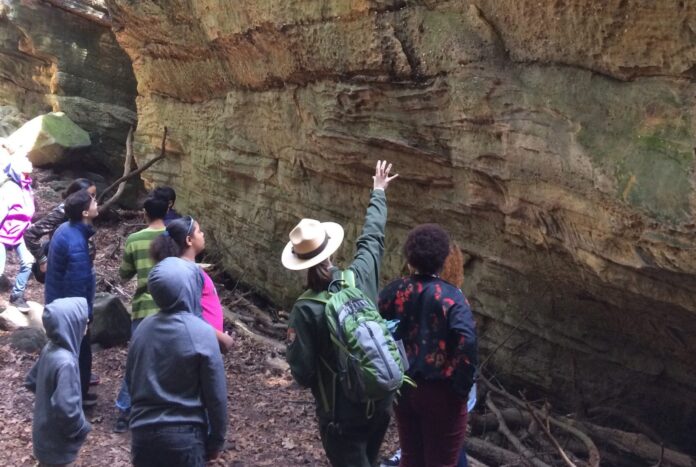Field trips can be transformative experiences for students: Having the chance to get outside of the classroom, learn from passionate practitioners and educators, and encounter new places and ideas can broaden the educational horizons for young learners.
Now a collaborative grant from the National Science Foundation will help Professor Marc J. Stern of the VA Tech College of Natural Resources and Environment research a range of STEM-based environmental education programs to determine how to best promote positive learning outcomes for students.
“The goals of this grant are pretty straightforward,” said Stern, a faculty member in the Department of Forest Resources and Environmental Conservation. “We’re looking into environmental education programs that are ubiquitous across the country, and we’re asking what factors are linked with better outcomes for students in the program. It’s a simple goal, but the study itself is very complex.”
The study, which is shared between Virginia Tech, Clemson University, and the University of North Carolina Wilmington, will observe 500 single-day environmental education field trips, identifying which program characteristics are most commonly associated with positive learning outcomes.
A second aspect of the project will be to understand these characteristics within a broad range of socio-economic contexts to improve educational outcomes for a diversity of audiences.
“When we started researching this subject years ago, we discovered that the components and characteristics associated with better outcomes were different for different audiences, but we didn’t have enough statistical data to say anything definitive,” Stern explained. “When we went back to the National Science Foundation, we asked to expand our sample size so we could answer not just how to improve these programs but how to improve them for different audiences.”
Each field trip observed in the new study will be assessed by criteria that Stern developed with Professor Robert Powell of Clemson University. The data collected will be merged with earlier data to create a comprehensive study of some 800 educational programs, measuring outcomes of environmental literacy, positive youth development, and a sense-of-place connection between students and their environment.
Stern and Powell have been collaboratively researching environmental education outcomes for 15 years. The third investigator on the project, Assistant Professor Troy Frensley of the University of North Carolina Wilmington, completed his doctorate with Stern at Virginia Tech.
“To me, the sign of a really good collaboration, the sign of colleagues that can help you really push the field forward, is an ability to disagree productively,” Stern said. “When Dr. Powell and I argue about a subject, we’re able to find the holes and mistakes from one another, and that makes the research that results from our work all that much stronger.”
Stern said that while some of the specific characteristics, including group size and the passion of the trip leader, are obvious factors related to student outcomes, the research is finding that some less commonly considered factors are also significantly related to student outcomes.
“One thing we’re finding crucial is the power of transitions between activities,” Stern explained. “Say you have a group of students in the forest. The instructor can say something like, ‘We’re going to go over this hill, and as we do so, you’re going to notice that the landscape changes. I want you to pay attention to that, and when we get to the other side, I’m going to ask you how it changed and why that might’ve happened.’ It’s a small detail, how an instructor manages a transition like that, but it turns out to be a crucial component to giving students a richer experience. We’re finding all sorts of lessons like that, all sorts of ways to better learning outcomes.”
Another aspect that Stern cites is the challenge of “novelty,” and how to strike the appropriate balance between something that is well-known to students and something that is completely new.
“If you think of the brain as a cognitive map, a set of pre-existing connections of knowledge, you want the experience to have a link to those already existing connections somehow,” Stern said. “If you’re 100 percent on the map, no learning is taking place, but if you’re not making a connection between novel information and at least something the kids already know, the experience can be lost on them. Exposing kids to new things in a way that relates to their lives is critical.”
The $1.9 million grant, which runs through 2023, is funded through the National Science Foundation’s Advancing Informal STEM Learning program, which seeks to advance STEM education experiences by building connections between students, researchers, and educators. It is a mission that Stern sees as crucial in fostering student engagement in the big problems of our time.
“All of the empirical research says that if you want to influence young students and instill skills and get them motivated to learn, getting them out in the field and getting them to be active learners instead of passive receivers of information is the way to do it,” he said. “This is where the whole field of teaching and learning is headed, and we want to make sure we’re making the best use of these educational opportunities.”
David Fleming


